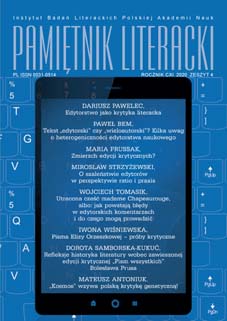Utracona cześć madame Chapeaurouge, albo: jak powstają błędy w edytorskich komentarzach i do czego mogą prowadzić
Lost Honour of Madame Chapeaurouge, or How Errors in Editor’s Commentaries Are Made and What They May Lead to
Author(s): Wojciech TomasikSubject(s): Language and Literature Studies
Published by: Instytut Badań Literackich Polskiej Akademii Nauk
Keywords: romantic epistolography; academic editing; prostitution; life pension
Summary/Abstract: A letter to his father, dated March 15th, 1830, and sent from Genève, mentions three balls in which young Zygmunt Krasiński took part. Footnote commentary by Stanisław Piogoń, the correspondence’s editor, indicates that “Chapeaurouge” from the letter is “probably a society nickname of a Genève woman,” thus suggesting the woman’s connection with a Genève red-light district. However, the letter does not use a nickname, but a real name: the hostess of the house mentioned by Krasiński was a greatly meritorious figure, one of so-called “Thirty Maidens of Genève,” who towards the end of the 18th century served to conduct a huge financial operation. The operation consisted in granting a loan to the French king by the Genève bankers, the repayment of which was to have been in the form of life pensions tailored to young and healthy girls. Mrs. Chapeaurouge was selected one of the girls to whom the life pension was to have been paid. The French Revolution cancelled the transaction, and in effect brought the Genève banks heavy loss. When young Krasiński met Mrs. Chapeaurouge, she belonged to the city’s elite. Her house was found at Rue des Granges, one of the most elegant street in Genève, in the surrounding neighbourhood of the place where Krasiński lived.
Journal: Pamiętnik Literacki. Czasopismo kwartalne poświęcone historii i krytyce literatury polskiej
- Issue Year: 111/2020
- Issue No: 4
- Page Range: 57-68
- Page Count: 12
- Language: Polish

